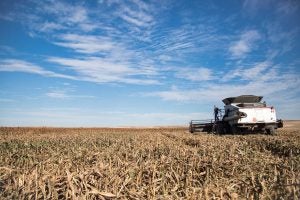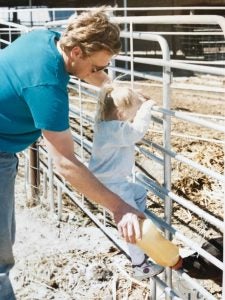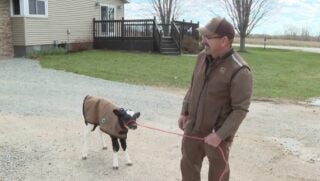Beck’s Hybrids premiered its Why I Farm Movement in 2013 and has since featured 21 farmers in beautiful, profound video and imagery. I learned of Beck’s movement earlier this year when I ran across a short video from Why I Farm on Facebook. In “A Planting Prayer,” a little girl thanks God for her family’s farm and prays for her father’s safety during spring planting.
It resonated.
“Dear Jesus, I know Daddy will go out to the fields tomorrow,” she prays. “He’s gone a lot, but I know it’s important.”
I’ve never gotten past those words without a flood of tears. I was that little girl 20 years ago, right down to the nighttime prayer. What’s different now is that I’m right there with my dad. I have a two-hour commute and my weekends aren’t for relaxing. They’re for him.
For 26 years I’ve been beside him. The time I have with him has changed as I’ve grown, graduated, and moved into a career. I still try to be there when he needs me. One day, I’ve promised myself, I’ll be there always.

Planting the future
Right now, more jobs are available than are being filled in agriculture. Between 2015 and 2020, about 35,400 U.S. students will graduate with degrees and expertise in agriculture, food, renewable natural resources, or the environment, expected to fill just over half of the anticipated available jobs in those fields. In a USDA study, of those anticipated available jobs, about 8,500 will be in food and biomaterials production, and only a fraction of those will be in farming and ranching. Such a small segment of the industry continues to sustain the world.
In terms of career soundness, production ag isn’t everyone’s first choice. On-farm debt continues to increase. Median farm household income mostly rose steadily for two decades until 2014 before dropping off in 2015, USDA Economic Research Service data indicates. Sector-level income is down from 2009-2014. Families have not been farming for four, five and six generations because they make a killing every year. They do it because they love it. It’s a lifestyle to which they’re connected with values in which they believe.
Sustainable and efficient
In 1860, nearly 50 percent of the U.S. population was “in agriculture,” according to the USDA’s National Agricultural Library. In 2010, that figure was less than 1 percent. Meanwhile, the labor force in agriculture dropped more than 86 percent, and the population increased by 881 percent. Nearly 900 percent. We are surrounded by an exponentially growing population that increasingly does not understand what we do or why we do it.
Agriculture is safer and more efficient now than it’s ever been. Farmers and ranchers are savvy businesspeople; they’re educated in and employ sustainable farming practices; they raise genetically superior and well-cared-for animals; and they use some of the most advanced technology on the market. The generations before mine have mastered their craft, but they won’t live forever. Production agriculture needs the next generation.

Family, friendship and community
American farming and ranching encompass a long list of operation types, family dynamics, income levels, degrees of precision, and lifestyles. From small produce farms to multi-enterprise operations — they’re still nearly 100 percent family owned.
In a TED Talk, psychiatrist Robert Waldinger, director of a 75-year Harvard study on adult development, revealed that the secrets to true happiness, satisfaction, and even health, are good relationships ¬¬– strong, fulfilling relationships with family, friends, and community.
So often we move away from our small communities in search of something more. Perhaps it’s necessary for some of us, maybe not for others. I moved hours away from my family and began a career. I grew, I learned, and after some soul searching, I think of it less as what my job can do for me and more as what I can do for others with the skills I’ve acquired. If you can bring your skills back to agriculture, back into those small communities, back to your families, I can only encourage that you do.
I still pray for my dad, my family and all farmers during spring planting and fall planting, calving season and hay season, wheat harvest and sorghum harvest. I still thank God every night for our farm and for choosing me to live this special way of life. I wish everyone could experience it, especially those who have only known city skylines. It can’t be explained in words. It can only be lived.
If this is your calling, keep it in the family. This is a way of life we can’t afford to lose.
Shelby Mettlen is a writer, photographer, and daughter of a fifth-generation farmer from central Kansas.



